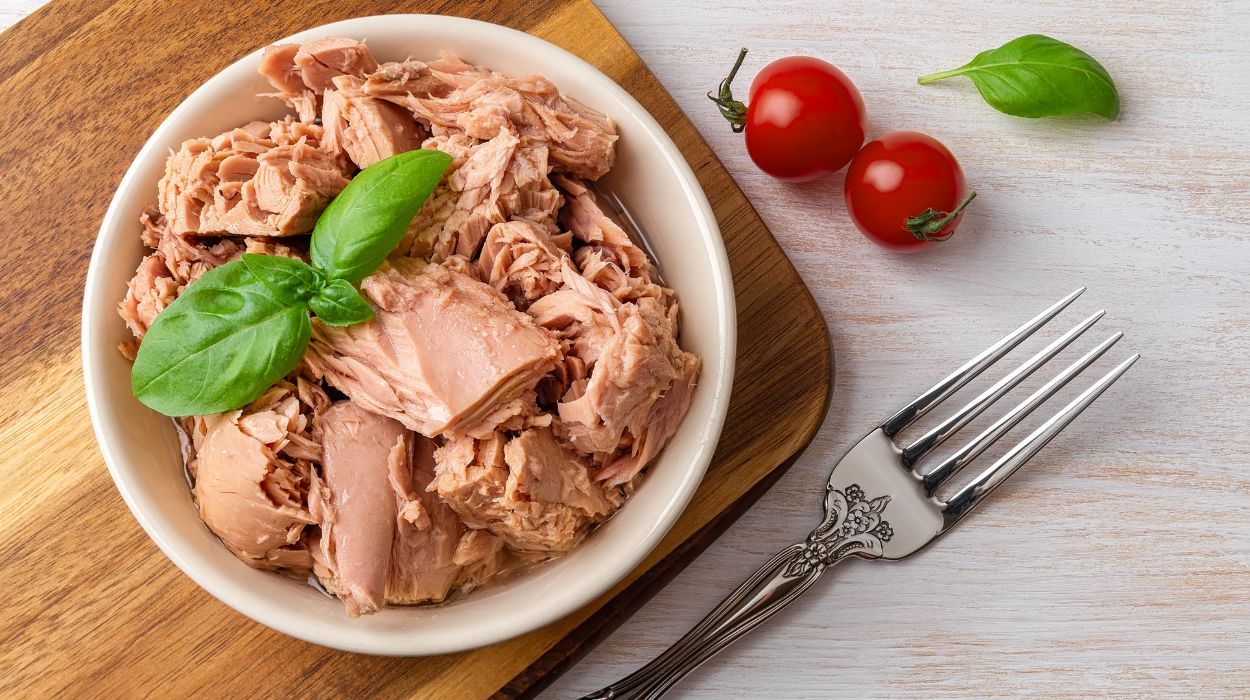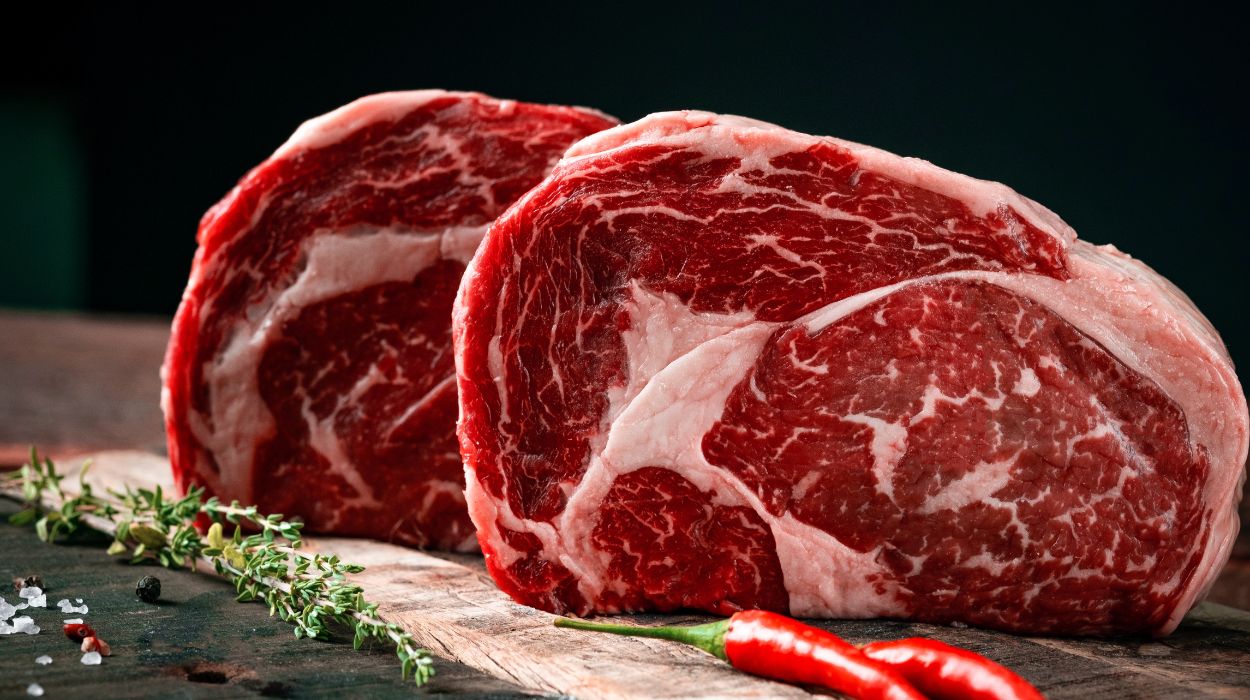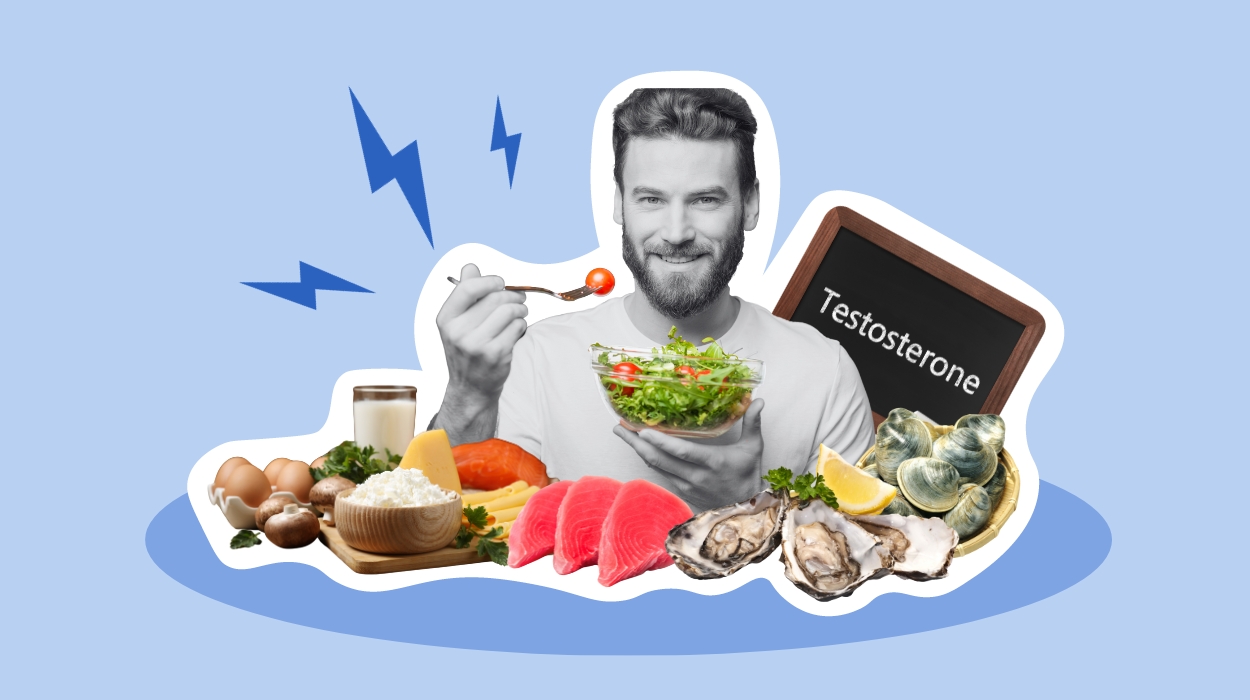The endocrine system[1] of the body mediates different human physiologic processes including metabolic needs, growth and development, reproduction, and homeostasis by maintaining hormone levels. Concerning sexual development and associated functions, the male sex hormones are integral to the development of the testes and the urogenital tract. Optimal testosterone levels are important for internal and external sexual development.
The conversion of testosterone into dihydrotestosterone (DHT), mediated by 5α-reductase, helps execute major sexual and other body functions in males. These functions include sexual maturity, bone health and muscle mass, hematocrit levels and erythropoiesis, and sexual function.
This article provides a detailed description of natural foods that help optimize the reproductive hormones including serum testosterone levels. The article also provides information regarding the signs and symptoms of decreased testosterone levels along with the different therapeutic modalities to boost testosterone levels.
Foods That Increase Testosterone
- Dairy Milk Fortified With Vitamin D
- Oysters
- Shellfish
- Fatty Fish Or Fish Oil Supplements
- Tuna
- Egg Yolks
- Extra Virgin Olive Oil
- Fortified Plant Milk
- Fortified Cereals
- Onions
- Leafy Green Vegetables
- Beans
- Beef
- Pomegranates
- Ginger
Foods That Boost Testosterone Levels
This section discusses different natural supplements and other foods that increase testosterone production and help treat testosterone deficiency.
Dairy Milk Fortified With Vitamin D
Vitamin D[2] has several target tissues in the human body including the male reproductive tract. Vitamin D supplementation increases testosterone levels in the body. Individuals treated with vitamin D have increased levels of free testosterone, bioactive testosterone, and total testosterone. Dairy milk is a natural food product that can be supplemented with vitamin D in order to promote more testosterone production in individuals with testosterone deficiency.
Oysters
Oyster[3] comprises natural testosterone-boosting supplements. Zinc is a macromineral present in oysters, which functions to reduce the enzyme, aromatase, preventing the conversion of testosterone into estradiol. Zinc deficiency reduces testosterone levels in susceptible individuals.
Shellfish
Similar to oysters, other shellfish[4] also contain vitamins, zinc, and magnesium that affect testosterone levels.
Fatty Fish Or Fish Oil Supplements
Fish oil supplements[5] include omega-3 polyunsaturated fatty acids, particularly docosahexaenoic acid, which influences testosterone production in men. Fatty acid intake increases the levels of testosterone, even in obese and overweight individuals.
Tuna

Tuna is a fatty fish containing an essential nutrient- vitamin D, which is important for the normal functioning of the immune system, in addition to increasing testosterone levels in the body.
Egg Yolks
Egg yolks contain cholesterol, which has anabolic effects that increase testosterone levels naturally. It also contains vitamin D, which helps boost testosterone naturally.
Extra Virgin Olive Oil
Extra virgin olive oil[6] contains polyphenols, which help to combat oxidative stress in the form of testicular toxicity and hematotoxicity. Olive oil is among the natural testosterone supplements for maintaining healthy testosterone levels.
Fortified Plant Milk
Fortified plant milk such as soy milk contains vitamin B12 and zinc, which combats the deficiency of these nutrients, and helps support healthy testosterone levels in individuals who consume a vegetarian-based diet.
Fortified Cereals
Fortified cereals are a rich source of vitamin D and zinc, which influence testosterone metabolism naturally. In addition to consuming essential minerals and vitamins from natural food sources, individuals are also encouraged to lose weight as it contributes to increased testosterone levels.
Onions
Onions[7] are associated with several health benefits including antioxidant and androgenic effects on the human body. It increases the antioxidant enzymes and strengthens the antioxidant defense mechanism, attributed to the Leydig cells, which promote the production of testosterone. Onions also enhance the production of luteinizing hormone, which naturally boosts testosterone levels.
Leafy Green Vegetables
Leafy greens are a rich source of folate, calcium, iron, potassium, vitamins A and E, and fiber. The health benefits of leafy greens include improved bone health, suppressed inflammation, and increased testosterone levels.
Beans
Velvet beans contain natural testosterone-boosting supplements including zinc, vitamin D, boron, vitamin K, and magnesium supplements. Ashwagandha present in velvet beans promotes spermatogenesis and increases sperm count. Magnesium supplementation increases the levels of free and total testosterone, which is of prime importance in mineral-sweating athletes.
Beef

Beef meat[8] contains micro-minerals including iron, copper, manganese, zinc, and selenium. This combats nutritional deficiencies in the body and restores the normal functions associated with these nutrients. Lean beef, however, significantly decreases testosterone levels.
Pomegranates
Pomegranate juice intake increases salivary testosterone levels, which in turn affects blood pressure and has positive outcomes on emotions, mood, and anxiety. Further health benefits of pure pomegranate juice are discussed in endocrine abstracts.
Ginger
Ginger[9] supplementation improves testosterone production and alleviates oxidative stress in males. Research has also shown the association between ginger and a related increase in testosterone synthesis in male diabetic rats.
Foods To Avoid
Processed Foods
The dietary intake of processed foods is characterized by a high concentration of calories, sodium, artificial sweets, and saturated fats. A high-caloric diet comprising processed foods leads to reduced testosterone levels.
Canned Or Plastic-Packaged Foods
Deep-fried foods[10] are related to a decreased quantity of testosterone along with low testicular function.
Alcohol
Heavy alcohol[11] consumption is implicated in decreased blood testosterone levels along with the impairment of the functioning of testicular Sertoli cells, which are important for sperm maturation.
What Is Testosterone?
Testosterone[12] is known as the primary male hormone, which is responsible for male reproductive health, and functions to improve male fertility, maintain sperm health, and develop male sexual characteristics. The regulation of healthy testosterone levels is mediated by the hypothalamic-pituitary-gonadal axis. The hypothalamus releases gonadotropin-releasing hormone (GnRH), which leads to the secretion of follicle-stimulating hormone (FSH) and luteinizing hormone (LH) by the anterior pituitary gland. LH stimulates the Leydig cells to produce testosterone.
Increased sex hormone levels elicit a negative feedback mechanism, which reduces GnRH and anterior pituitary hormones that ultimately decrease testosterone levels. The majority of the testosterone in the blood is bound to albumin and Sex Hormone-Binding Globulin (SHBG). The remaining are the free testosterone levels in the blood.
Signs That You Have Low Testosterone
Constantly Irritable
Individuals with low testosterone levels exhibit irritability, depression, dysphoria, lack of assertiveness, and low vitality and vigor. Low testosterone levels are also related to signs and symptoms of depression and fatigue in the affected individuals. The association between low testosterone levels and the onset of persistent irritability is highlighted by mood disturbances in individuals with prostate cancer, administered androgen-deprivation therapy.
Similarly, positive outcomes in mood and depressive symptoms are observed in individuals receiving thyroid replacement therapy.
Feeling Depressed
Men found to have low testosterone levels are likely to demonstrate increased depressive symptoms. Likewise, men with depressive symptoms are likely to have lower total T levels as compared to their counterparts without depression.[13] Testosterone is released in response to a variety of stimuli including physiological, social, and sexual factors, which target the brain by affecting behavior and mood. Low testosterone levels give rise to discomfort, pain, sleep disturbances, decreased energy, and low libido.
Difficulty with Concentration
The process of aging is an important etiological factor of testosterone deficiency in males, causing testosterone levels to fall with an increase in age. Difficulty in concentration and the loss of memory, particularly, in older men, is more significantly associated with the process of aging rather than low testosterone levels.
Low Libido
There is a strong association between low T levels and reduced libido in the affected individuals. Low libido is the most important symptom reported by men with low T levels. Studies, however, report that low libido is a function of low LH instead of solely depending on testosterone levels.
Erectile Dysfunction
Low testosterone levels are also associated with the development of erectile dysfunction.[14] Various health conditions that decrease free testosterone levels in the blood include chronic alcoholism, liver disorders, dyslipidemia, or neuropathy. Testosterone is also implicated in vasodilation effects in the penis and mediating erection by better blood flow and blood pressure, hence, low testosterone may directly influence the development of erectile dysfunction.
Diagnosis
The diagnosis[15] of testosterone deficiency involves low serum testosterone levels on a blood test and associated clinical symptoms. The prevalent symptoms of testosterone deficiency include reduced nocturnal erection, male factor infertility, erectile dysfunction, and decreased libido. The systemic side effects of testosterone deficiency include sleep disturbances, depressed mood, increased adiposity, decreased cognition, reduced bone mineral density, reduced muscle mass, and hot flashes.
Physical examination findings in testosterone deficiency include reduced testicular volume, visceral obesity, decreased muscle mass, gynecomastia, and decreased body hair.
Laboratory-based diagnosis of testosterone deficiency involves the measurement of serum benefit testosterone levels. This is performed on two different occasions in the morning. Additional endocrine testing in individuals with confirmed or suspected testosterone deficiency comprises the measurement of serum LH levels, prolactin levels, and iron saturation for assessing hemochromatosis.
Other Ways To Boost Testosterone
Testosterone increases upon an increase in physical activity with regular exercises, pharmaceuticals including testosterone replacement therapy, and different herbal agents. However, endurance-trained men demonstrate a negative correlation between stress hormones[16] including cortisol and testosterone.
Conclusion
In addition to pharmaceutical formulations that increase testosterone levels, the natural interventions include the intake of healthy, maintenance of healthy body weight, and natural mineral or vitamin supplements for boosting hormonal health. These interventions are not only useful for mediating male reproductive health, but the many health benefits of these interventions are instrumental to the overall health and well-being of individuals.
Frequently Asked Questions
The clinical manifestations of testosterone deficiency include delayed sexual maturation, hypogonadism, gynecomastia, loss of pubic hair, and visceral obesity in males.
Zinc functions as an aromatase blocker, which prevents the conversion of testosterone into estradiol, therefore, maintaining increased levels of testosterone in the body.
 Expert's opinion
Expert's opinion
